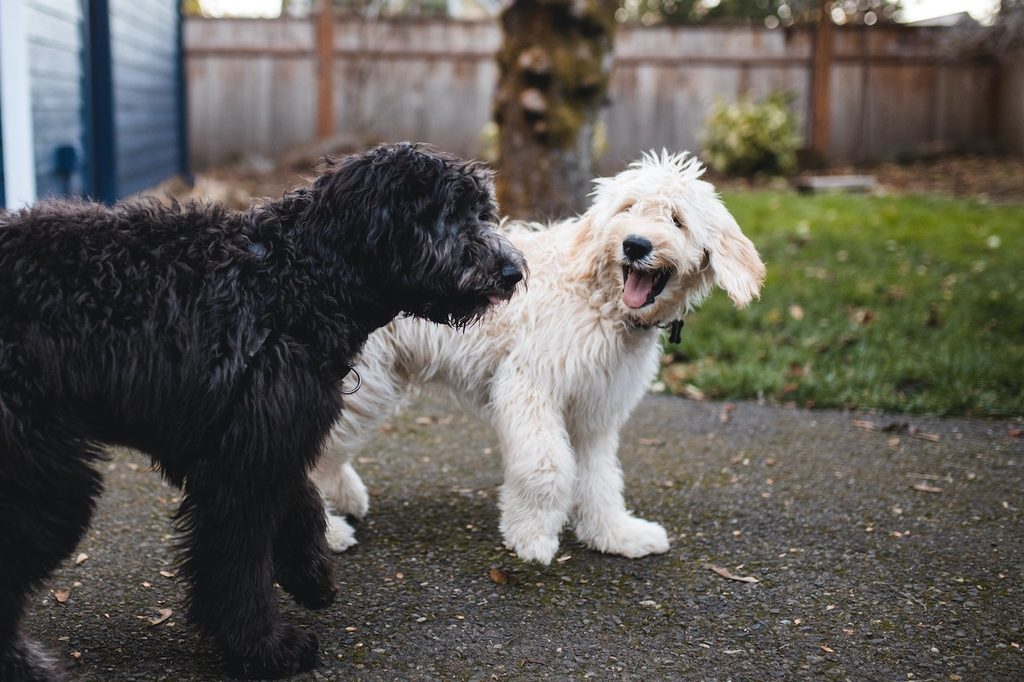
Most of us hear dogs barking frequently, some even every day or multiple times. You might look forward to the sound of your pooch greeting you with a happy bark at the door or dread an angry snarl from the neighbor’s poorly behaved beastie, but there’s a lot more to barking than meets the ear.
This complex form of communication actually can have many different meanings both on its own and coupled with other indicators, like body language. While your dog barking at nothing might annoy you when it happens at 3 a.m., you’ll be far better prepared to handle it if you understand what’s behind the noise.

Why do dogs bark?
The real question should be, why do humans talk? A dog bark, though not exactly the same as our speech, works essentially the same way. Your pup might bark to communicate happiness, fear, aggression, hunger, or boredom. Of course, they also use barking as a tool in of itself — to alert.
Dogs that are service animals or otherwise trained might bark when they smell, see, or hear something in particular, but almost all puppers will let out an arf now and then. Essentially, woofs have at least some meaning and you should pay attention now and then to make sure you know what’s going on with your canine.

What do different barks mean?
When you’re diving into interpreting dog barks, you have to use all the available information about the yips. Listen closely to pitch, duration, frequency, volume, and timbre. For example, a low growl with intermittent deep barks almost certainly acts as a warning. You might hear this when a new mail person approaches your house and Fido decides that it’s unacceptable. On the complete opposite side, a very short, high-pitched yap that could signal a desire to play or eat a favorite snack.
Distinguishing between a play bark and an aggressive one seems pretty easy. Some vocalizations will take more time and effort to understand. Not to mention, every animal is different, which means even two dogs from the same litter will have slightly different communication styles. Your job as a pet owner is to study your own four-legged friend and start to memorize each of their different barks, whines, and growls.

How do you train a dog to stop barking?
Here’s the truth: You probably don’t want to train your dog to stop barking entirely. It’s just not feasible or beneficial for anyone. In the wild, wolves mainly use barking as an alert (they use other sounds for other things), and so your guard dog will likely have some of those tendencies. Some, like Goldens, won’t even bother to scare away even a terrifying intruder, but many pooches love to use their personalities to protect their humans.
While training is important, you almost certainly don’t want to get rid of all of their defensive instincts. However, all dog behavior has a place, and your pet likely will be happier if you work out when barking is OK and when they should keep quiet. Here’s how to get Fido to cool it on the barking.
Ignore it
The worst thing you can do is reward their behavior when you want it to stop. That means not giving it too much attention and never praising your pup by accident for the wrong kind of bark. Luckily, you can still give a quick “no” and then redirect or tune them out. If your buddy woofs for food at dinner time, be sure not to give them dinner right away. The “quiet” command will help here, too.
Teach them “quiet”
Funnily enough, the quiet command often goes hand in hand with “speak,” as that can help your animal to understand that you’re connecting the sounds coming out of their mouth to your words. If your beastie barks in any particular situation (such as when someone knocks on the door), it will be necessary to practice your “quiet” even under those circumstances. Wait until they have some idea of what you’re looking for, and then go through it a few times.
Get them used to their world
You know that the creak in the floorboards and the warble of the water heater don’t mean that enemies are attacking the homestead, but your dog doesn’t. Any time you bring your pet to a new place, they will need a bit to get used to the new environment. Help this along by introducing your pup to different stimuli like the dog park, hotels if you travel often, other people’s homes, and outdoor dining.
Dog barking can be funny, cute, or annoying, but no matter the circumstances, the best way to handle it is to figure out the root cause. Once you understand your animal’s different woofs, you’ll be able to work out a few ways to stop them from arfing all the time.



